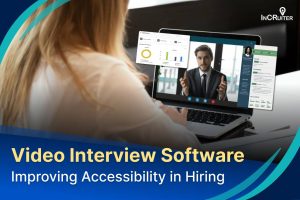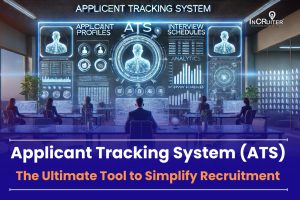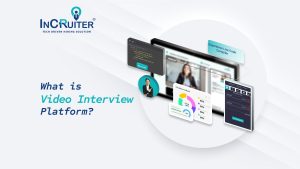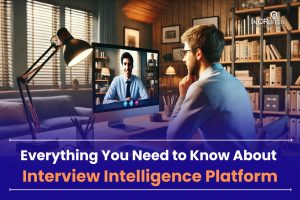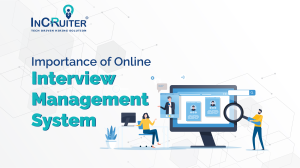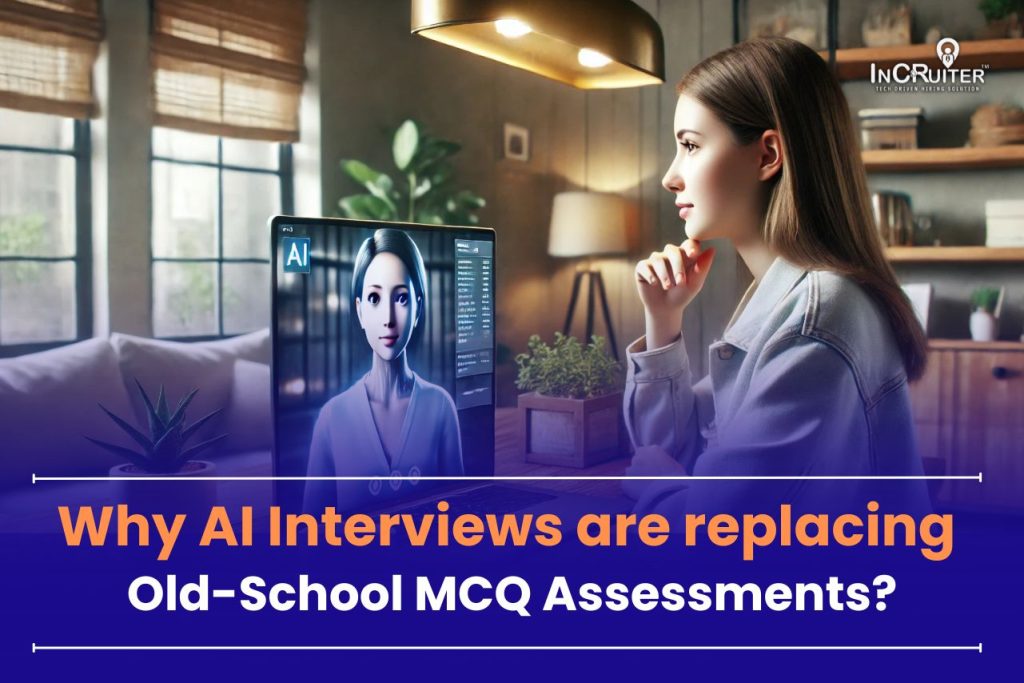
“Can someone’s ability to choose the right option from A, B, C, or D predict how well they’ll perform on the job?” It’s a question many hiring managers are finally starting to ask, and for good reason. For decades, MCQ assessments have been the go-to method for filtering candidates quickly and cheaply. But in today’s fast-paced, skills-first world, this approach is falling behind. AI interviews are stepping in to take the lead.
These modern tools don’t just test what a candidate knows, they evaluate how they think, how well they communicate, and how confidently they solve problems in real time. In this blog, we’ll break down why MCQs are no longer enough, what makes AI interviews the smarter alternative, the tech advancements that made it all possible, and how this shift is transforming hiring for the better. Whether you’re in HR or job hunting, this is one evolution you can’t afford to ignore.
The Era of MCQ Assessments: Why They Were Popular?
Simplicity Was the Winning Point
Not long ago, hiring teams loved using MCQ tests. They were easy to roll out. A single test can be shared with hundreds of people with minimal planning. It was fast, cheap, and didn’t need much support. In fact, back in 2015, around 70% of companies picked this method to filter people during hiring, as mentioned in a SHRM report. It made sense at the time. But now? Not so much. Things have moved forward. Hiring today needs more than just a fast quiz. Companies want to understand how someone thinks and reacts. They want to see real actions, not just quick answers. MCQs, while still simple, no longer match the need.
No Fancy Setup Needed Back Then
Back in the day, MCQs worked well in places with less tech. No laptop? No problem. A piece of paper and a pen did the job. No internet? Still worked. This made the format useful in many places where tech wasn’t ready yet. But now, things are different. A 2022 report from Glassdoor said 92% of people use their phones to apply for jobs. That number tells a lot. Job seekers today expect better tools. They want to show what they know in ways that feel real. Talking. Showing. Solving real tasks. Silent paper tests don’t give them that chance. MCQs feel too flat now. They don’t help people show their full ability.
Only About Book Smarts
MCQs were great when hiring meant testing what someone remembered. They worked well for questions like “What’s the capital of a country?” or “Solve this math problem.” At that time, facts and memory mattered most. But now, the focus has changed. A study from LeadershipIQ found that 89% of bad hires happen not because someone lacked knowledge, but because of things like poor teamwork, weak thinking, or bad habits. These are soft skills and MCQs don’t test those. They won’t tell you if someone can stay calm under pressure or if they’ll help a team succeed. Knowing something is one thing. However, being able to use it effectively is another matter.
Cheap, But At What Cost?
No one can deny that MCQs were budget-friendly. You could build a test once and use it again and again. For companies watching their budget, that felt perfect. But saving money on hiring doesn’t always lead to smart hiring. A study in the Harvard Business Review pointed out that traditional interview methods miss top candidates about 50% of the time. That’s a scary number. Picking the wrong person doesn’t just slow down the team; it also eats up time, money, and effort. Sure, MCQs cut early costs, but they may bring bigger losses later. Better hiring tools may need a bit more investment upfront, but they help find the right people, and that saves more in the end.
Also read: How Conversational AI is Revolutionizing One-Way Video Interviews?
Limitations of MCQ Assessments
They Only Check What You Remember
Multiple-choice tests mostly check if someone remembers facts. They don’t show how people think or solve problems. You might know a formula, but can you use it when the situation is new or confusing? These tests don’t help us find that out. They don’t give space to show your thinking steps or how you deal with real situations. Many jobs now need people who can think quickly and deal with new problems. But these tests don’t help in finding such people. They look neat on paper, but real jobs don’t work like that.
No Way to See People Skills
Doing well at work is not just about knowing things. It’s also about how you speak, how calm you stay when stressed, and how well you work with others. But MCQs don’t check any of that. You click a box, and that’s it. No one can see how you explain your idea, how clearly you speak, or how you behave under pressure. A report by LinkedIn in 2023 showed that most recruiters now care about both hard skills and people skills. But these tests completely miss one side of the story.
Too Much Guessing, Not Enough Understanding
Here’s a big problem, these tests can be passed by luck. If someone practices lots of questions, they might start seeing patterns. Then, even if they don’t really understand the topic, they may still guess the right answer. It becomes more about tricks than learning. The worst part? The recruiter won’t know if the answer was guessed or earned. There’s no way to check how the person reached the answer. That can lead to hiring people who don’t actually know the work well, which can later turn into a big loss for the company.
Same Test for Everyone
MCQs don’t change from one person to another. No matter who is giving the test, whether a fresher or a senior person, the questions stay the same. But people are different. Someone applying for a marketing role may not need the same test as someone applying for coding. Still, these tests don’t adjust. They don’t care about your background or what you’re best at. They just run the same way every time. And because of that, they miss seeing what makes someone truly fit for a job. A test that doesn’t adjust often leads to unfair results.
Also read: Time is Money: How AI Interview Tools Save Both
The Technology Gap That Kept AI Interviews Away — Until Now
For a long time, interviews done by machines felt like something far away. The tools were not ready to handle how people talk or act. Software had a hard time making sense of what someone really meant. It could not catch voice changes or facial signs properly. Internet speed was slow, and devices could not manage quick back-and-forth replies. Hiring teams had little trust in systems that skipped details or gave strange replies.
But all that has changed quickly. The latest technological development now picks up how people speak, the tone they use, and even what they feel. Conversational AI asks new questions based on earlier replies. They also notice signs of doubt or confidence just by scanning the facial expression. Faster computers and better cloud services now run the whole thing smoothly. Additionally, AI proctoring ensures that all data remains private, which was a significant concern previously.
What once looked far from real is now used daily by all kinds of companies. From small startups to large organisations, more people now believe in this way of hiring. It saves time, removes guesswork, and gives everyone a fair chance. The old gap between an idea and something that actually works has now been filled. With less effort and better results, the hiring process feels much more real and helpful for everyone.
Core Technologies Powering Modern AI Interviews
1. Natural Language Processing (NLP)
When it comes to making machines understand people, natural language processing is what enables this. This is how interview platforms now figure out what someone really means when they speak. Tools like GPT and BERT don’t just read words; they understand what someone is trying to say. They notice tone, sentence meaning, and how ideas are put together. This helps hiring systems look at how clearly someone talks and how strong their thoughts are. It’s no longer just about right or wrong. It’s more about why someone said something and how they explained it.
2. Speech-to-Text Technology
AI interviews now go far beyond typing answers. Thanks to speech recognition tools, spoken words turn into text quickly and clearly. Tools like Google’s voice converter or Amazon’s speech service can pick up many ways of speaking, no matter the speed or accent. Even if there’s background noise, they still do well. This makes voice interviews easier to do from any place. The system also catches things like tone and pauses, which can tell a lot about how someone feels. Unlike old tests, this gives the person a voice, not just answers on a screen.
3. Machine Learning Algorithms
Machine learning lets the interview tools keep getting smarter with time. They look at past data and pick up useful habits from it. Systems built on TensorFlow or PyTorch study how good candidates solve tasks, speak, or express emotions. The more they learn, the better they become at spotting talent. These tools don’t just give scores, they provide clear feedback based on real behavior. This way, each interview round becomes a little better than before. It’s not fixed like normal tests; it grows with every new person who tries it.
4. Large Language Models (LLMs)
Big models like GPT-4 help the system make smart and custom questions on the spot. These tools read job details and know what kind of person fits a role. They don’t give the same questions to everyone. Instead, they shape the talk based on the job and the person. This means the interview feels more real and less like a quiz. The questions change depending on how the person answers. It helps show how someone thinks, not just what they know. This is what makes the process feel more real and helpful.
5. Computer Vision and Video Intelligence APIs
Old tests miss the small things like how someone smiles, where they look, or if they seem nervous. But computer vision tools can see all that. They watch facial movement, eye focus, and expressions in a smart way. With tools like OpenCV and Google’s video scanner, these systems turn regular video into useful data. It helps spot honesty, comfort, and effort. Visual signs, like posture and eye contact, give clear clues that are easy to miss in a written test. This adds an emotional side to how hiring works, which can be just as important.
6. Cloud Computing Platforms
Running hundreds or thousands of interviews across the world needs strong support. That’s where cloud services come in. Big platforms like AWS and Google Cloud help with storage, speed, and safety. Whether someone applies from a big city or a small town, their experience stays the same. These systems also keep private details safe and make sure nothing breaks down. With the help of cloud tools, even small teams can use smart hiring tools without worry. The tech runs in the background, making things smooth and ready for growth.
Also read: Top Candidate Screening Techniques to Elevate Your Hiring in 2025
Why AI Interviews Outperform MCQs in Today’s Hiring Landscape?
Smarter Matching with AI JD Parsing
One major limitation of MCQs is their disconnection from real job needs. They don’t adapt to the actual job description or resume. AI interviews solve this by automatically parsing the job description and matching it with each candidate’s resume. This ensures only relevant candidates are interviewed, and the questions are closely tied to the job’s responsibilities. It eliminates guesswork and improves hiring precision. Recruiters no longer have to manually match CVs with job roles. AI takes care of it, reducing time spent on initial screening and allowing better focus on candidate quality from the very beginning of the recruitment cycle.
Interview Questions Auto-Generated by AI
MCQs use predefined, static questions that don’t change based on the job or the candidate. That’s a huge drawback in modern hiring. AI interviews, on the other hand, generate questions dynamically using natural language processing and job-role mapping. These questions are tailored to match the candidate’s background and the job’s exact requirements. They’re not just harder to guess but also more insightful for hiring managers. By creating meaningful, contextual queries, AI interviews ensure that recruiters evaluate what truly matters and how well the candidate fits the role. This intelligent questioning gives a level of depth that MCQs cannot provide.
Invite Candidates in Bulk Easily
In MCQ-based assessments, recruiters often spend hours manually coordinating interviews, calling candidates, sending multiple follow-up messages via email, WhatsApp, or SMS just to confirm availability. This process is repetitive, prone to errors, and time-consuming, especially when handling multiple profiles. AI interviews completely remove this burden with built-in single and bulk invite options. Recruiters simply upload candidate details, choose a question set, and send out a private or public interview link in one click. Candidates can access the interview at any time that suits their schedule, eliminating the need for back-and-forth coordination. This automation not only speeds up the hiring process but also enhances the candidate experience.
Conversational AI Enables Dynamic Interaction
Static MCQs follow a strict script; there’s no room for flexibility. In contrast, conversational AI makes AI interviews more engaging and lifelike. The system interacts with candidates in real-time, asking follow-up questions based on their responses. This mimics an actual conversation, helping to assess thinking patterns, communication style, and problem-solving approach. It also keeps candidates more alert and focused, reducing the risk of pre-prepared answers. By offering a dynamic assessment experience, AI interviews uncover deeper insights that MCQs simply cannot capture. This real-time adaptability is one of the key reasons why AI interviews have redefined early-stage screening.
Assess All Skills in One Place
MCQs are great for testing knowledge recall, but fall flat when it comes to holistic assessment. They can’t evaluate communication, logical reasoning, personality traits, or coding fluency. AI interviews cover all of this. The platform can test soft skills, verbal responses, aptitude, technical depth, and even live coding abilities with its coding assessment platform. This integrated skill evaluation provides hiring teams with a comprehensive view of a candidate’s potential. No need to juggle between platforms or rely on shallow test scores. By offering a unified solution, AI interviews create a seamless hiring process that is both efficient and data-rich.
Instant Interview Transcript and Summary
With MCQs, all you get is a scorecard. You don’t know how the candidate reached an answer or how they explained their logic. AI interviews change that. Every response is recorded, transcribed, and summarized in easy-to-read reports. Recruiters can review behavioral patterns, language clarity, and key points discussed during the interview. This creates a transparent feedback loop for both candidate and employer. It also ensures hiring decisions are made with full context and documented insight. Compared to basic MCQ outcomes, AI-generated summaries add real value by enabling structured evaluations and helping teams align better on hiring decisions.
Detect Dishonesty with AI Proctoring Tools
Cheating is a real concern in MCQ-based hiring. Candidates can take help, guess answers, or even use unfair means without being caught. AI interviews tackle this head-on with advanced proctoring tools. Features like facial recognition, voice consistency checks, screen activity tracking, and eye movement detection help identify unusual behavior during interviews. These technologies ensure that candidates are evaluated in a secure, monitored environment. Recruiters gain confidence in the authenticity of each interview result. Unlike MCQs that offer no visibility into test behavior, AI interviews give full control and transparency, reducing risks and increasing hiring accuracy across the board.
Use Your Own Branding Seamlessly
Candidate experience plays a big role in modern hiring, and MCQ tools rarely offer customization. With InCruiter’s white-labeled AI interview platform, companies can host interviews with their own logo, brand colors, and custom messaging. This builds trust with candidates and delivers a consistent employer brand experience. From the invitation email to the interview interface, everything reflects your company’s identity. It positions your organization as tech-savvy and people-first. While MCQs feel generic and transactional, a white-labeled AI interview feels professional and aligned with modern expectations. This not only improves candidate perception but also helps attract high-quality talent looking for serious opportunities.
Also read: InCruiter’s AI Interviewer – How It Stands Out from Other AI Interviewing Platforms?
Comparative Study: MCQ Assessments vs AI Interview Platforms
| Criteria | MCQ-Based Assessments | AI Interviews Assessment |
| Question Type | Fixed and pre-set options | AI generates role-specific screening questions for better assessment |
| Skill Measurement | Tests memory and basic knowledge | Soft, Aptitude, Tech, Coding skill assessment |
| Flexibility | Scheduled | 24×7 On-Demand |
| Cheating Detection | Easy to guess or search for answers | Harder to fake as face, voice, and actions are monitored |
| Hiring Accuracy | May miss real talent with strong thinking but poor test skills | A better understanding of how someone thinks and reacts |
Conclusion
The hiring landscape is evolving, and MCQs are quickly becoming a thing of the past. Their rigid structure and limited insight no longer match the demands of today’s fast-paced, people-first workplaces. In contrast, AI interviews provide dynamic, interactive experiences that assess candidates beyond their technical expertise. They evaluate communication clarity, thought process, emotional intelligence, and an individual’s performance in context. This shift is not just about technology; it’s about hiring smarter and more fairly. Companies today need tools that reflect real job scenarios and human potential.
If your team is ready to move beyond outdated methods, InCruiter AI-powered interview solutions are built to deliver sharper insights and better hiring outcomes. Let’s make hiring more human.
Ready to Transform Your Hiring Process?
Discover how our AI-powered interview platform can streamline your recruitment and find the best candidates faster.

